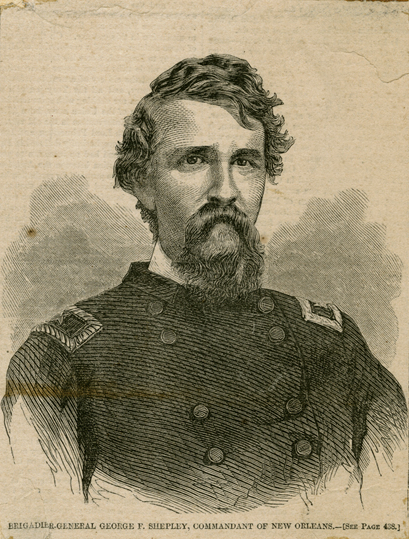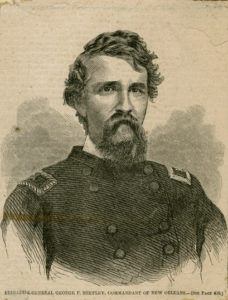George Foster Shepley
General George Shepley became the military governor of federally-occupied Louisiana in June 1862 and served until March 1864.

Courtesy of The Historic New Orleans Collection
Brigadier General George F. Shepley. Unidentified
General George Shepley became the military governor of federally-occupied Louisiana in June 1862 and served until March 1864. In effect, Shepley functioned as an aide to Gen. Benjamin Butler and, after Butler’s departure, Gen. Nathaniel Banks. Representing and communicating the wishes of his military superiors, Shepley acted primarily as a liaison between Union officials and the citizens of occupied Louisiana, generally unable to please either constituency.
George Foster Shepley was born in Saco, Maine, on January 1, 1819. After graduating from Dartmouth College in 1837, he practiced law in Bangor from 1839 to 1843. From 1848 to 1849 and 1853 to 1861 Shepley served as a US district attorney. During the Civil War (1861-1865), he was commissioned colonel of the Twelfth Maine Infantry in 1861 and then promoted to the rank of brigadier general a year later.
Having met and befriended Benjamin Butler at the 1860 Democratic National Convention, Shepley and his unit fought under Butler’s command in the 1862 capture of New Orleans from Confederate forces. When Butler became administrator of New Orleans, he named Shepley acting mayor in April 1862 and governor of Louisiana a little more than a month later. As governor, Shepley attempted to appease citizen groups while acting as a spokesperson for higher authorities in the Union, perhaps an impossible task. When Nathaniel Banks replaced Butler as commander of the Department of the Gulf in December 1862, Shepley soon lost what little power he had. Banks undermined Shepley’s leadership by removing his power to decide civil cases and supervision of the provost marshal’s office. Following a special election held in 1864, LouisianaUnionist Michael Hahn replaced Shepley and became the first civil governor of the state since secession.
After leaving Louisiana, Shepley was assigned to the District of Eastern Virginia where he became military governor in 1865. In June of that year, Shepley resigned his commission and returned to Maine where he practiced law until becoming a US circuit court judge in 1869. He died in Portland, Maine, on July 20, 1878.
Adapted from Minnie Thomas Bailey’s entry for the Dictionary of Louisiana Biography, a publication of the Louisiana Historical Association in cooperation with the Center for Louisiana Studies at the University of Louisiana, Lafayette.
Sources: E. J. Warner, Generals in Blue (1964); Joseph G. Dawson, III, Army Generals and Reconstruction: Louisiana, 1862-1877 (1982).
